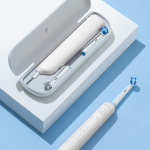In order to achieve clean and sparkly teeth, new techniques and technology have always been invented and adopted. That being said, the manual toothbrush is still relevant and widely used around the world to this day. It somehow remains the popular choice for most people.
But that doesn't mean you should keep using it. There are other options that you could use to achieve a much better result. One of them is an electric toothbrush that boasts the ability to give a ten times better result than a manual toothbrush.
The other option is something called an ionic toothbrush. A new type of toothbrush that uses a chemical reaction to totally clean your teeth. What is an ionic toothbrush? How does it work? Is it better than a manual toothbrush? Or is it perhaps better than an electric toothbrush as well? This brief article will tell you all you need to know about an ionic toothbrush.
As the name suggests, an ionic toothbrush is a toothbrush that utilizes a chemical reaction called ionic bonds in order to clean your teeth. To simplify a complex scientific principle, ionic bonds are all about the polarity charges of everything in this world.
There are those that have a positively charged nature while others have a negatively charged nature. And just like with a magnet, the opposite polarity charges attract each other while the same polarity charges would repel each other. And that basic principle is what the ionic toothbrush uses to remove plaque from your teeth.
By utilizing the aforementioned ionic bonds principle, an ionic toothbrush could thoroughly clean your teeth from plaque. The reason for it is because your teeth are negatively charged while the plaque is positively charged. And as we all know now, opposites attract each other.
So in order to force the plaques out of your teeth, it needs an outside intervention that could change the polarity of either one of them. And that's where an ionic toothbrush comes in. When you use an ionic toothbrush, it will be filled with a negatively charged ion.
When the negatively charged brush comes in contact with the teeth that are also negatively charged, it will force the teeth to be filled with positively charged ions. And since the teeth and the plaque finally have the same polarity now, they will instantly repel each other.
But it doesn't stop there. Since the toothbrush is negatively charged, all of the positively charged plaques that are repelled from the teeth would stick to the toothbrush. So in a sense, the teeth would repel the plaques and the toothbrush would catch it.
The technology behind a manual toothbrush has been around for hundreds of years. But no matter what kind of changes are applied to it, the principle behind it stays the same. You grip the handle and brush your teeth with the brush.
But due to the difference in polarity charges between the teeth and the plaque, no amount of force could undo the ionic bonds between the two. An ionic toothbrush, on the other hand, was designed to take advantage of the ionic bonds that bind the plaque to the teeth.
By changing the polarity of the teeth to be positively charged, it will automatically repel the plaques by itself. So yes, I can say without a doubt that an ionic toothbrush is better at removing plaques than a manual toothbrush.
Despite being powered by a motor and having brush heads that have different kinds of movement, the basic principle behind an electric toothbrush remains the same as a manual toothbrush. You move the brush to clean the teeth. Just like you brush your car to remove any stain.
Thanks to its powerful motor and a wide variety of brush head designs and movement, an electric toothbrush manages to achieve a better result than an ordinary toothbrush. But it won't be able to remove the plaques completely.
Compare that to an ionic toothbrush that doesn't even need to use any motor and only utilizes a basic chemical principle to achieve much better and cleaner teeth. It is clear from the beginning which one is the superior option for your dental care out of the two. And yes, an ionic toothbrush is better than an electric toothbrush.
Housed inside the handle of an ionic toothbrush is a lithium-ion battery that is connected to a titanium rod that runs along the length of the toothbrush. Wrapped in the middle of the handle is a thin metal plate around the same size as a thumb. Other than this, the overall design of an ionic toothbrush is quite similar to a manual toothbrush.
In order to use it, all you have to do is simply wet your thumb or at least until it is somewhat moist. Then, simply press the thin metal plate with your moist finger and brush your teeth the same way you'd use a manual toothbrush.
By pressing your thumb to the thin plate, you'd trigger closed-circuit electricity that would charge the toothbrush with negative ions. After that, even a light brush to your teeth would be enough to alter the polarity of your teeth.
We brush our teeth every day for a single purpose, and that is to have clean and healthy teeth. That's why most of us jump at the chance to use a new technology that promises to deliver better dental care.
Unfortunately, most toothbrush technology out there couldn't achieve the level of care and cleanliness that we want and need. But that is no longer the case with the arrival of an ionic toothbrush.
Ionic toothbrushes use a chemical reaction to solve the root of the problem regarding our teeth and the plaques. Ionic toothbrushes clean our teeth by working on a molecular level and that's why it is way better than both manual and electric toothbrushes.





